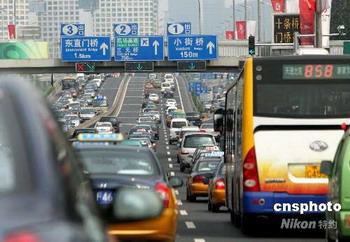Sunday saw the lifting of vehicle control measures in Beijing. The measures were put in place for the Olympics and Paralympics.

Beijing traffic saw radical increase on Sunday, the first day after the city's two-month alternating odd-even license plate system for the Olympic Games ended.
It's just gone eight in the morning in Beijing and this is traffic downtown in the Chinese capital. This is also the first day following the lifting of car ban controls, operational since July the 20th to ease congestion and improve air quality during the Olympics and Paralympics.
The ban on vehicles on alternate days according to their car plates, was aimed at taking 45 percent of all private vehicles off the roads. But with all cars now back on the road, drivers think traffic could get a lot heavier. Although, perhaps, not right away.
Beijing bus driver said, "Today's traffic is ok because it's Sunday. Monday will be a hard day for us because people will be driving to work. Buses will slow down a great deal."
The traffic control forced private car owners to take public transport. Some may have balked at first, but they soon got used to the idea and found it a pleasant experience.
Subway passenger, said, "The subway is very convenient. Much faster than driving. We should drive less and use the subway more."
Earlier, the success of this scheme had prompted many members of the public to call for a continuance of the policy. Authorities shelved the request, but restrictions are still in place for government-owned cars, which make up some 10 percent of Beijing's 3.3 million vehicles. And this is welcomed by citizens.
Passenger said, "Car ban measures should be put on government vehicles, not on common people's private cars."
Beijing's traffic authority says it has received many submissions from car owners comfortable with restrictions and hope they will stay in place.
The city will also continue to improve its public transport service by expanding networks while keeping fares low.
Experts say the car ban might be a cure for congestion but not necessarily the best one. There are other possible methods, such as congestion charges and raising parking fees that have proved effective in other countries.
(China Daily September 24, 2008)